新版外研版英语七年级上册知识点大全
七年级上英语外研知识点归纳总结
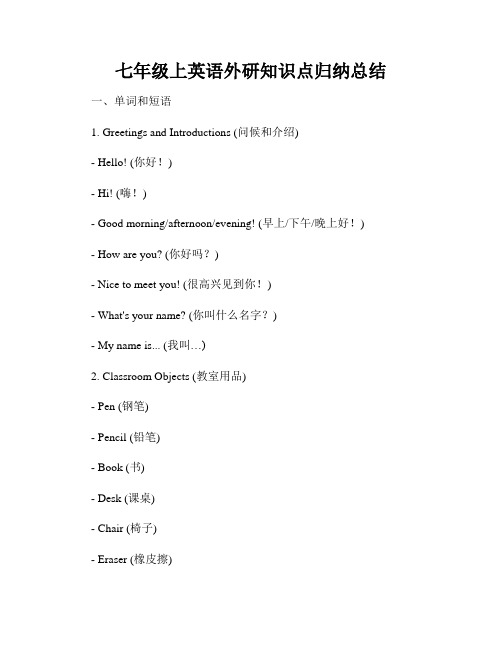
七年级上英语外研知识点归纳总结一、单词和短语1. Greetings and Introductions (问候和介绍)- Hello! (你好!)- Hi! (嗨!)- Good morning/afternoon/evening! (早上/下午/晚上好!)- How are you? (你好吗?)- Nice to meet you! (很高兴见到你!)- What's your name? (你叫什么名字?)- My name is... (我叫…)2. Classroom Objects (教室用品)- Pen (钢笔)- Pencil (铅笔)- Book (书)- Desk (课桌)- Chair (椅子)- Eraser (橡皮擦)- Ruler (尺子)- Bag (书包)3. Numbers (数字)- Zero (零)- One (一)- Two (二)- Three (三)- Four (四)- Five (五)- Six (六)- Seven (七)- Eight (八)- Nine (九)- Ten (十)4. Days of the Week (星期) - Monday (星期一)- Tuesday (星期二)- Wednesday (星期三)- Thursday (星期四)- Friday (星期五)- Saturday (星期六)- Sunday (星期日)5. Family Members (家庭成员) - Mother (妈妈)- Father (爸爸)- Brother (哥哥/弟弟)- Sister (姐姐/妹妹)6. Colors (颜色)- Red (红色)- Blue (蓝色)- Yellow (黄色)- Green (绿色)- Orange (橙色)- Purple (紫色)- Black (黑色)- White (白色)二、语法知识点1. 一般现在时- 表示经常性或习惯性的动作或状态。
Starter知识点 2024-2025学年新外研版英语七年级上册

新外研社七上知识点sb.=somebody 某人 sth.= something 某事;某物 sp.=someplace 某地do代表动词原形 doing代表动词ing形式 to do为动词不定式did 代表动词过去式Starter要掌握的重点内容:名词、数词、冠词、一般将来时、一般过去时、并列连词and/but/or、基本句型1.welcome to + sp.(某地)欢迎来到某地2. a new stage of ... ...的新舞台/阶段learn new subjects 学习新科目3.learn to do sth. 学会做某事learn from sb. 向某人学习learn about sth. 了解某事/某物4.make friends with sb. 和某人交朋友5.be ready for sth. =prepare for sth. 为某事做好准备be ready to do sth. =prepare to do sth. 准备好做某事get prepared = get ready 做好准备6.forget to do sth. 忘记去做某事forget doing sth. 忘记做过某事7.Moral Education and Law 道德与法治education n. 教育→educational adj. 有教育意义的law n. 法律→ lawyer n. 律师rmation Technology 信息技术information 不可数science technology 科学技术9.sports trousers 运动裤 sports jacket 运动夹克sweater 毛衣 coat 外套;大衣 shirt 男士衬衫 blouse 女士衬衫skirt 短裙 dress 连衣裙 school uniform 校服shorts 短裤 pants 裤子 jeans 牛仔裤10.名词短语:a/an + 形容词 +可数名词单数(a grey jacket)形容词+可数名词复数(black shorts)11.一般将来时(simple future tense)句式:肯定:① sb. will do sth. 某人将会做某事如:I will go to junior high school tomorrow.② sb. am/is/are going to do sth. 某人打算去做某事如:He is going to wear a shirt.否定:① will not=won't如:I won't go to junior high school tomorrow.② am/is/are not going to =am not/isn’t/aren’t going to如:He isn’t going to wear a shirt.疑问:① will sb. do sth如:Will you go to junior high school tomorrow?What will you do tomorrow?② am/is/are sb. going to do sth.如:Is he going to wear a shirt?What is he going to wear?表示将来的判定词:tomorrow 明天、the day after tomorrow 后天、tonight/this evening 在今晚、in the future 在未来next year/week/... 明年/下周/下个...in two days/...(时间段) 两天后/...(时间段)后 ...12.有某物在某个地方的表达方式:There is + a/an+可数单数名词 (+介词短语).There is some +不可数名词 (+介词短语).There are some +可数复数名词 (+介词短语).There is a playground in my school. 有一个操场在我的学校里。
外研版七年级英语上册M1-10重点知识大全
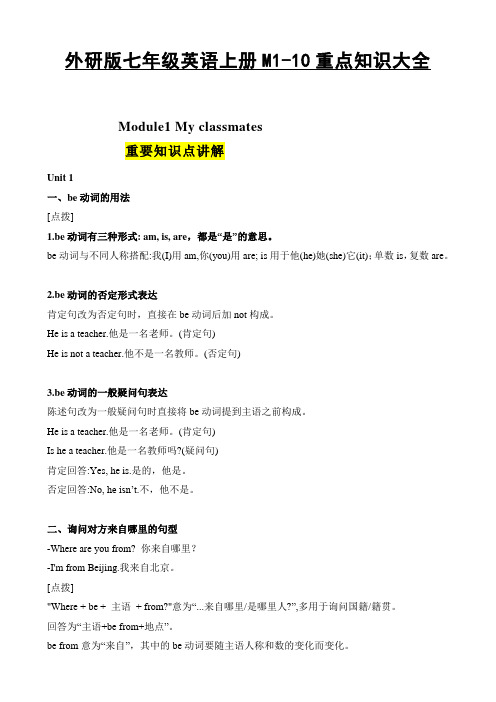
外研版七年级英语上册M1-10重点知识大全Module1 My classmates重要知识点讲解Unit 1一、be动词的用法[点拨]1.be动词有三种形式: am, is, are,都是“是”的意思。
be动词与不同人称搭配:我(I)用am,你(you)用are; is用于他(he)她(she)它(it);单数is,复数are。
2.be动词的否定形式表达肯定句改为否定句时,直接在be动词后加not构成。
He is a teacher.他是一名老师。
(肯定句)He is not a teacher.他不是一名教师。
(否定句)3.be动词的一般疑问句表达陈述句改为一般疑问句时直接将be动词提到主语之前构成。
He is a teacher.他是一名老师。
(肯定句)Is he a teacher.他是一名教师吗?(疑问句)肯定回答:Yes, he is.是的,他是。
否定回答:No, he isn’t.不,他不是。
二、询问对方来自哪里的句型-Where are you from? 你来自哪里?-I'm from Beijing.我来自北京。
[点拨]"Where + be + 主语+ from?"意为“...来自哪里/是哪里人?”,多用于询问国籍/籍贯。
回答为“主语+be from+地点”。
be from意为“来自”,其中的be动词要随主语人称和数的变化而变化。
三、用于确定对方国籍的句型-Hi, are you English too?嘿,你也是英国人吗?-No, I’m not. I’m American and my name is Betty King. 不,我不是。
我是美国人,我叫贝蒂·金。
[点拨]"Are you+国籍?"通常在没有把握确定对方国籍时用此句型。
该句是一般疑问句,肯定回答用“Yes,I am.”否定回答用“No,I'm not.”。
新版外研版七年级(上册)英语知识点解析

新版外研版七年级(上册)英语知识点解析本文是对新版外研版七年级(上册)英语课程内容进行的知识点解析,旨在帮助学生更好地掌握英语知识。
语法知识点1. 祈使句祈使句是表达命令、请求、劝告等意义的句子,通常用动词原形作谓语。
例如:- Sit down.- Don't be late.- Study hard.2. 一般现在时一般现在时表示现在经常、惯性的动作或者真理等。
一般现在时的肯定句结构为:主语 + 动词原形(第三人称单数要加-s)。
例如:- She often takes a bus to school.词汇知识点1. 数词数词用来表示数字、数量的词汇。
例如:- one, two, three, four- first, second, third, fourth2. 物品名称研究物品的名称可以帮助我们更好地了解和描述身边的事物。
例如:- pencil, eraser, ruler, book- desk, chair, blackboard, whiteboard交际知识点1. 问路当需要问路时,我们可以使用以下语句:- Excuse me, where is the nearest post office?- Can you tell me how to get to the library?2. 自我介绍自我介绍时,我们可以使用以下语句:- Hello/Hi, my name is ___. I am ___ years old.本文总结了新版外研版七年级(上册)英语课程中的相关语法、词汇、交际知识点,帮助学生更好地掌握英语知识,提高英语水平。
外研版七年级英语上册语法知识点汇总
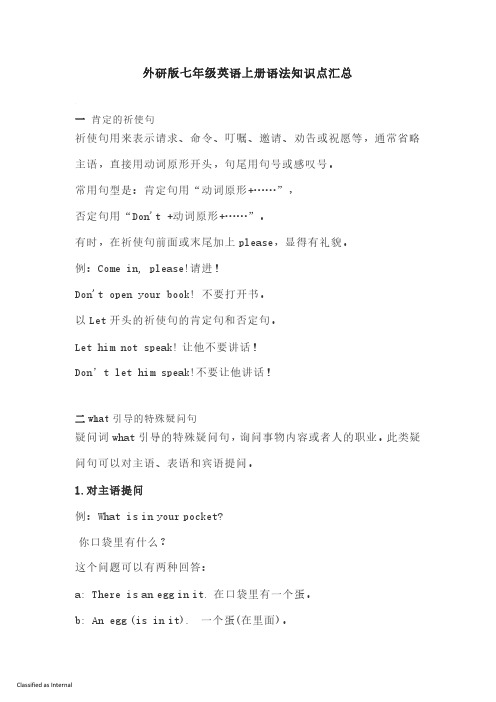
外研版七年级英语上册语法知识点汇总一肯定的祈使句祈使句用来表示请求、命令、叮嘱、邀请、劝告或祝愿等,通常省略主语,直接用动词原形开头,句尾用句号或感叹号。
常用句型是:肯定句用“动词原形+……”,否定句用“Don't +动词原形+……”。
有时,在祈使句前面或末尾加上please,显得有礼貌。
例:Come in, please!请进!Don't open your book! 不要打开书。
以Let开头的祈使句的肯定句和否定句。
Let him not speak!让他不要讲话!Don’t let him speak!不要让他讲话!二w hat引导的特殊疑问句疑问词what引导的特殊疑问句,询问事物内容或者人的职业。
此类疑问句可以对主语、表语和宾语提问。
1.对主语提问例:What is in your pocket?你口袋里有什么?这个问题可以有两种回答:a: There is an egg in it.在口袋里有一个蛋。
b: An egg(is in it). 一个蛋(在里面)。
-What are there in the room?屋子里有什么?-There are a lot of chairs in it. 里面有许多椅子。
注意:回答此句型的问题时,答句的单复数根据实际情况而定。
2.对宾语提问例:-What did you buy?-你买了什么?-I bought a bike.-我买了辆自行车。
3.对表语提问例:-What is this?-这是什么?-It's a bench. -这是一条长凳。
-What is your mother? -你妈妈是干什么的?-She is a teacher. 她是一名老师。
注意:What is+人? 此句型询问人的职业。
还可用What is sb's job?或者What does/do sb. do? 询问人的职业。
三情态动词can表请求情态动词can表请求can除了表示“能够(强调能力)”的含义,还可以表示“能否”的含义。
七年级上册英语外研社版知识点总结
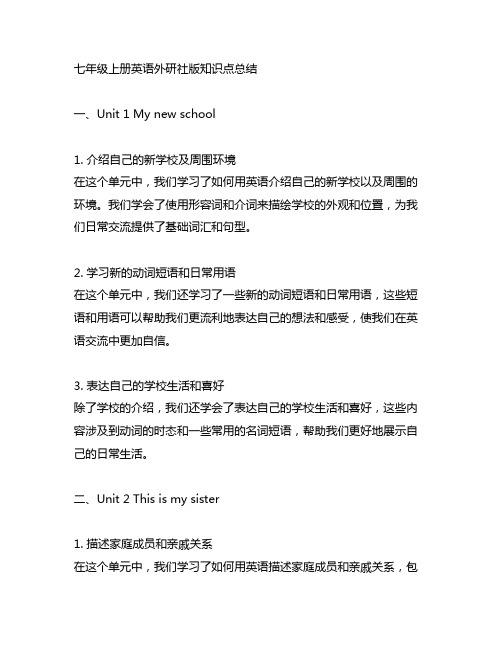
七年级上册英语外研社版知识点总结一、Unit 1 My new school1. 介绍自己的新学校及周围环境在这个单元中,我们学习了如何用英语介绍自己的新学校以及周围的环境。
我们学会了使用形容词和介词来描绘学校的外观和位置,为我们日常交流提供了基础词汇和句型。
2. 学习新的动词短语和日常用语在这个单元中,我们还学习了一些新的动词短语和日常用语,这些短语和用语可以帮助我们更流利地表达自己的想法和感受,使我们在英语交流中更加自信。
3. 表达自己的学校生活和喜好除了学校的介绍,我们还学会了表达自己的学校生活和喜好,这些内容涉及到动词的时态和一些常用的名词短语,帮助我们更好地展示自己的日常生活。
二、Unit 2 This is my sister1. 描述家庭成员和亲戚关系在这个单元中,我们学习了如何用英语描述家庭成员和亲戚关系,包括使用人称代词和家庭成员的称呼,让我们能够更好地向别人介绍自己的家庭。
2. 表达自己的爱好和特长我们还学习了如何用英语表达自己的爱好和特长,这些内容涉及到一些常见的动词和名词,为我们展示自己的个性提供了更多的表达方式。
3. 学习新的动词和形容词在这个单元中,我们也学习了一些新的动词和形容词,这些词汇可以帮助我们更准确地描述自己和家人,让我们的表达更加生动和有趣。
三、Unit 3 Is this your pencil?1. 学习和巩固物品的名称在这个单元中,我们学习了一些日常用品的英文名称,包括文具、衣物等,这些词汇是我们日常生活中必不可少的,掌握了这些词汇可以让我们在购物和交流中更加得心应手。
2. 学习特殊疑问句除了学习物品的名称,我们还学习了如何用特殊疑问句来询问别人是否拥有某样物品,这也为我们以后的交流提供了更多的句型结构。
3. 学习并掌握新的介词和代词在这个单元中,我们还学习了一些新的介词和代词,这些词汇的掌握可以让我们更准确地描述物品的位置和归属,提高我们的口语表达能力。
新版外研版英语七年级上册
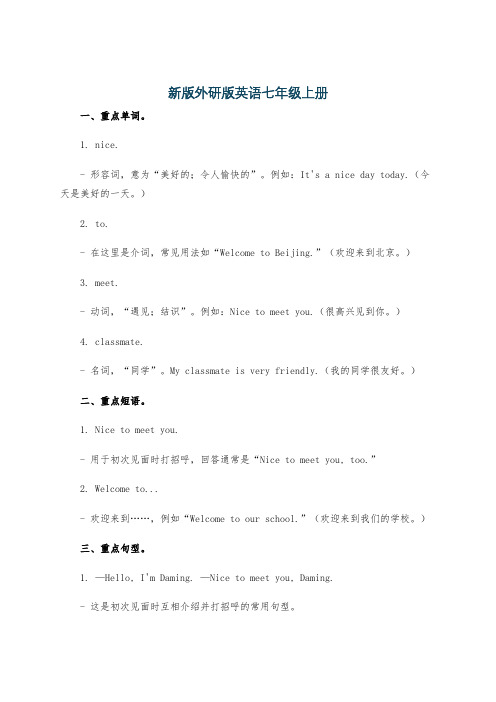
新版外研版英语七年级上册
一、重点单词。
1. nice.
- 形容词,意为“美好的;令人愉快的”。
例如:It's a nice day today.(今天是美好的一天。
)
2. to.
- 在这里是介词,常见用法如“Welcome to Beijing.”(欢迎来到北京。
)
3. meet.
- 动词,“遇见;结识”。
例如:Nice to meet you.(很高兴见到你。
)
4. classmate.
- 名词,“同学”。
My classmate is very friendly.(我的同学很友好。
)
二、重点短语。
1. Nice to meet you.
- 用于初次见面时打招呼,回答通常是“Nice to meet you, too.”
2. Welcome to...
- 欢迎来到……,例如“Welcome to our school.”(欢迎来到我们的学校。
)
三、重点句型。
1. —Hello, I'm Daming. —Nice to meet you, Daming.
- 这是初次见面时互相介绍并打招呼的常用句型。
2. I'm from...
- 表示“我来自……”,例如“I'm from China.”(我来自中国。
)。
外研版七年级上册英语全册知识点归纳

外研版七年级上册英语全册知识点归纳MODULE 1一、同义句1.My name's Daming. = I'm Daming.2.I'm from England. = I come from England.3.Are you a new student? ≈ Are you new?4.Nice to meet you. = Nice to see you. =Glade to meet you. = Glade to see you.5.What's your name ? = May I have your name?二、特殊疑问句1. 询问姓名:—What's your name? —My name is .... = I’m…—What's his/her name? —His/her name is .... = He/She is…2.询问年龄:—How old are you? = Can you tell me your age?= What's your age?—I'm twelve years old.3.询问来自哪里:—Where are you from? —I'm from...—Where is he/she from? —He’s/She’s from...—Are you from China ? —Yes, I am/ we are. No, I’m not/ we aren’t.4.询问在哪个班:—What class are you in? —I'm in Class One, Grade Seven.三、单词1.China —Chinese America —American England —English capitalcity2.small — big first— last everyone all四、语法1.代词人称代词主格I you he she it we you they形容词性物主代词(…的)my your his her its our your their 2.be动词: am I am= I’m I am not= I’m notis He /She is = He’s /She’s is not = isn’tare We /You /They are = We’re / You’re /They’re are not= aren’tMODULE 2一、单词grandparents grandfather—grandmother parents father—mothermum---dad daughter—son sister—brother aunt—uncle cousin husband---wife family woman---man women---men职业:job actor driver doctor manager nurse worker teacher policeman 工作地点:factory hospital hotel office school theatre bus station shop二、短语a photo/picture of my family in front of in/at the front of next to on the right --- on the left三、语法1.this---that these---those I---we he/she/it---they2.名词所有格:Miss Li's =her Tom’s = hisLily and Lucy's 两人共有的eg: Lily and Lucy's desk is bigLily's and Lucy's 两人各有的Lily's and Lucy's desks are small.My parents’ room is very clean.四、句子1.---Is this your sister? --- Yes, it is. No, it isn’t---Are these her books? ---Yes, th ey are. No, they aren’t.2.---Who is this? --- This is my brother.--- Who are they/these? --- They are my cousins3. ---What’s your sister’s name?---My sister’s name is…/Her name is…4.---What does your father do?=What is your father's job?=What is your father?---He is a ...MODULE 3一、单词1.buildings: classroom, dining/sports hall, library, office, science lab, playground2.something: blackboard, book , room, computer, desk, furniture, map,wall, picture,television3.numbers: thirteen fourteen fifteen sixteen seventeen eighteen nineteenthirty forty fifty sixty seventy eighty ninety4.介词:next to ≈ near behind ≠ in front of in/at the front of:在......里面的前面in on under5. in the middle of on the left of--- on the right ofbetween …and… a map of our school6.right 正确的≠wrong右边的≠left二、句子1. Where is the office building ? It is between the dining hall and the library.2. How many students are there in your class? There are 38 students in my class.三、语法(There be)----Are there any school offices?----Yes, there are. There are some offices.----Is there a computer on Miss Li's desk?----No, there isn't.注意:1.就近原则:1). There is an orange and two apples on the desk.There are two apples and an orange on the desk.2). There are some students in the classroom.Are there any students in the classroom? Yes, there are. No, there aren’t 3)There aren’t any students in the classroom.There isn’t an orange on the desk.MODULE 4一、family members:aunt uncle grandma grandmother grandpa grandfather mother father mum dad sister brother二、短语句型Thank you for your email.your help.helping me.asking me.inviting me.Make a family tree for your family.----How many people are there in your family?----There are four. There are my mum and dad, my sister and me.----Have you got an aunt?/any .....?----Yes,I have./No,I haven't.----Have you got a small family or a big family?----I've got a big family.or的用法:①或; (选择疑问句)②并列否定:I don't like swimming or dancing.MODULE 5-6一、单词1. orange 橙汁have some orange [U]橙色the oranges are orange [C]橙子This is an orange [C]2.kind 善良He is very kind.种类=tyre a kind / type of fruit two kinds /types of fruits3. gym: 不受天气影响的室内体育馆、健身房或运动馆stadium: 周围有看台的露天大型运动场4.healthy ≠ unhealthy keep/stay healthy保持健康in good health ≠ in poor/bad healthbe healthy = be in healthbe good for one’s health ≠be bad for one’s health名词变复数条件变化形式例词一般情况+ - s shops单词以s、x、ch、sh结尾+ - es buses 以辅音字母+y结尾去y为i + -es city-cities 单词以“o”结尾有生命+ - es tomatoes无生命+ - s zoos一些以‘f’或‘fe’结尾的单词把’f‘或’fe‘变成’ves'knife-knives二、短语三、句型四、区别MODULE 7一、短语talk about sth.谈论某事talk to sb. 跟某人谈话(一方讲一方听)talk with sb. 跟某人谈话(双方都讲)get up≠go to bedgo home≠leave home(for)study science/history/chemistry/maths/...二、语法①时间表达法:What's the time? =What time it is?顺读法:It's two ten. 2:10 (直接读出数字)逆读法:①It's ten past two.(2:10) ≤30'②It's ten to ten. (2:50) >30'整点表达法:It's two o'clock. (2:00) 注意:(不用介词)②一般现在时(1)【No. 1】一般现在时的功能1.表示事物或人物的特征、状态。
- 1、下载文档前请自行甄别文档内容的完整性,平台不提供额外的编辑、内容补充、找答案等附加服务。
- 2、"仅部分预览"的文档,不可在线预览部分如存在完整性等问题,可反馈申请退款(可完整预览的文档不适用该条件!)。
- 3、如文档侵犯您的权益,请联系客服反馈,我们会尽快为您处理(人工客服工作时间:9:00-18:30)。
外研版英语七年级上册知识点大全Module1 Classmates1. ---What’s your name? ---What’s his name? ---What’s her name? ---My name is Tom. / I’m Tom.---His name is Daming. ---Her name is Lingling.2. be from = come from 来自I am from China. = I come from China. 我来自中国。
Where are you from? = Where do you come from? 你来自哪儿?3. ---How old are you? ---How old is he / she? ---I’m 15 years old. ---He / she is 14 years old.4. ---What class are you in? ---What class is he in?---I am in Class 1, Grade 7. ---He is in Class 1, Grade 7.5. Good to see you. = Nice to see you. = Glad to see you. 见到你很高兴。
6. What about= How about怎么样(询问)What / How about your school life?7. the capital of…的首都Beijing is the capital of China.8. a very big city 一个非常大的城市Shanghai is a very big city.9. first name = given name 名字last name = family name 姓10. welcome to sp. 欢迎来到某地Welcome to China.11. I’m from China. I’m Chinese. I can speak Chinese. I’m from England. I’m English. I c an speak English.12. I am from China, too. I can also speak English. I don’t like the book , either.13. Is everyone here today? 今天大家到齐了吗?14. Chinese: 中国人,中国的I am Chinese. 中国人I am a Chinese girl. 中国的English: 英国人,英国的I am English. 英国人I am an English girl. 英国的作文1 About myself.My name is Tom. / I’m Tom. I’m a student in No. 1 Middle School. I am 15 years old. I’m from China and I am Chinese. I can speak English , too. I am in Class 1, Grade 7. I like sports. / I like doing sports. My favourite sport is basketball. / Playing basketball is my favourite sport.范文2 My friendThis is my friend. His name is Bob. He is from America. Now he is in Beijing. He is 13 years old. He’s in No. 14 Middle School. He is in Class One, Gra de One. We’re in the same class. His father is a teacher. He teaches English. His mother is a teacher , too. His parents are in the same school. But his parents aren’t in our school.Module2 My family Vocabulary:A family: father—mother dad (daddy)—mum ( mom) / mummy parent –parentsuncle —aunt brother—sister son—daughter husband—wife man -- womanboy — girl grandfather -– grandmother grandpa –- grandma grandparent – grandparents cousinB job: a driver, a farmer, a worker, a manager, a teacher, a student, a doctor, a nurse,a singer, a writer, an actor, an actress, a policeman, policewoman,C place: at a bus station, in a hospital, in a hotel, at a theatre, on a farm, at school, in the shop, in a factory1. I have an elder brother. 哥哥She has a younger / little sister. 妹妹2. This is a photo of my family. 一张我的全家福My family is a big one. 家庭This is Jim’s family tree. 家谱My family are watching TV now. 家人3. on the left 在左边on the right 在右边on the left / right of 在…的左边/ 右边4. next to 在…旁边,紧挨着= beside = near5. in front of 在…前面(相对独立)in the front of 在……前部(在…内部)There is a tree in front of the house.There is a blackboard in the front of the classroom.6. at the bus station 在公共汽车站at school 在学校at the same hospital 在同一所医院at a police station 在警局7. (be) in hospital(生病)住院in the hospital 在医院Tom is ill in hospital because he is ill. Tom’s father works in the hospital.8. in the photo 照片上There is a big house in the photo.9. a manager of a theater = a theater manager 一个剧院经理10. a manager of a hotel = a hotel manager 一个旅馆经理11. a bus driver 一位公共汽车司机 a farm worker 一位农场工人a shop worker 一名店员an English teacher 一位英语老师12. man –woman (men –women) a woman doctor –women doctors 女医生 a man teacher – men teachers 男老师There are three men teachers in the office.13. Is this / that your family? → Yes, it is. / No, it isn’t.Are these / those your parents? → Yes, they are. /No, they aren’t.14. Who is this? Who is this boy?Who are the boy and the girl? They are my friends.15.问职业:What is your mother? = What does your mother do? = What is your mother’s job? What be + 名词(主语)?What do / does + 主语+do? What be one’s job?16. 介绍家庭常用的句型。
1) This is a photo of my family.2) I have a big / small family.3) There are ____ people in my family. They are _____ and I.4) This is … and this is ….5) My father / mother is a ________ in a ________.6) I love my family very much. / I have a happy family.范文:My familyI have a big and happy family. There are six people in my family. They are my grandfather, grandmother, father, mother, my brother and me. This is my grandfather Henry. He is 65 years old. And Maria is my grandmother. She is 63 years old this year. These are my parents. My father is George, He is 37 years old. He is a doctor. My mother’s name is Sandra. She is 34 years old. My little brother is Tom. He is an eight-year-old boy. My name is Lily and I am 12 years old. I am a student. I love my family.Module3 My schoolVocabulary:A: in the dining hall (have meals), in the library (read books), in the office (work), on the playground (do sports), in the sports hall (play table tennis)on the blackboard, in the classroom, in the computer room (play computer) at the school gate, in the science lab, on the desk,a map, a television, a dictionary, a teaching building, a classroom building, a science building, an office building, some furnitureB: in, on, near = next to = beside, at / in front of, in the front of, on the left / right of, in the middle of, between…andC: one, two, three, four, five, six, seven, eight, nine, ten, eleven, twelve, thirteen, fourteen, fifteen, sixteen, seventeen, eighteen, nineteen, twenty, thirty, forty, fifty, sixty, seventy, eighty, ninety, hundred1. a lot of furniture, a piece of furniture :一件家俱There is lots of furniture in my room. Furniture是不可数名词2. a map of China, a map of the world, a map of England, a map of America3.There is a map of the world on the wall. There are 4 windows in the wall.4. There are many apples on the tree. There is a bird in the tree.5. There is a tree in front of the house. The driver is sitting in the front of the bus.6. This is the classroom building with 24 classrooms. 这座教学楼有24间教室。
